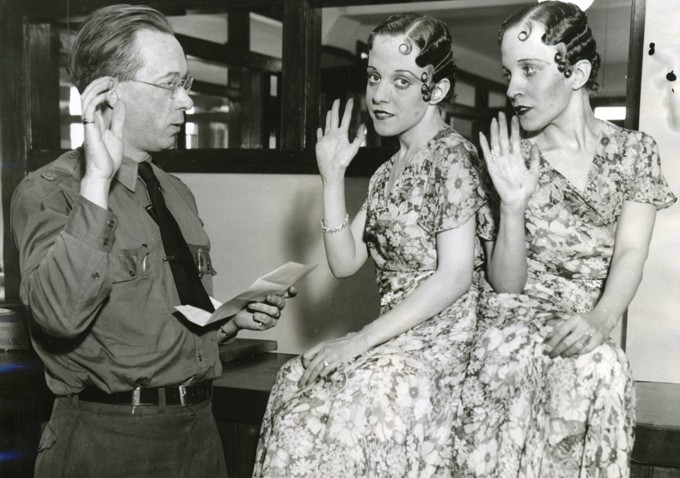At
the height of their fame, conjoined twins Daisy and Violet Hilton were the
toast of vaudeville. They were among the highest-paid entertainers on the
circuit, and a young Bob Hope was part of their routine. With the coming of the
movies, however, vaudeville went into decline, and the fortunes of the Hilton
sisters went with it. Ironically, they are now most commonly remembered for
their work in the medium that effectively killed their career: principally for
their appearance, as themselves, in Tod Browning’s notorious pre-code horror film Freaks. Leslie Zemeckis’ documentary
recounts their remarkable but profoundly difficult life, from the twins’ birth
in Britain to their deaths in a small town in North Carolina, where they were to
be found working the checkouts at a grocery store during their final years.
Bound By Flesh is a continuation of
Zemeckis’ work on the history of twentieth-century entertainment, which began
with her 2010 documentary about burlesque, Behind
the Burly Q (the title, also, of her recently published book on the subject).
Though it revels in the more sensationalistic aspects of Daisy and Violet’s
career — their publicity-stunt marriages and string of failed love affairs — the
documentary also offers more sober insights into their lives, stressing in
particular their remarkable rise from sideshow “attractions” to fully fledged
vaudeville performers, and rebellion against the adoptive family who sought to
maintain an exploitative hold over their careers.
Women and Hollywood talked to Zemeckis about the “love story” between the two sisters and the importance of looking behind the “sideshow” curtain. The film opens on June 27th.
W&H: You became aware of the Hilton sisters through your work on Behind the Burly Q. What drew you to their story?
LZ: Their struggle. That they are largely forgotten today or only remembered as one of the “freaks” in the film Freaks.
W&H: The film gives us a fascinating insight into the often harsh realities of the sisters’ lives. Was part of your motivation in making a film devoted to these two women a desire to reclaim their stories, in essence to go beyond the more sensationalistic aspects of their history?
LZ: Yes, they certainly had to be more than just “sideshow exhibits.” I wanted to go beyond the musical “sideshow” and see who these sisters were. I quickly saw it as a love story between two sisters.
W&H: Daisy and Violet join other strong female performers of burlesque/vaudeville immortalized in your work. What is the particular appeal of this entertainment genre for you, as someone who has written and performed in her own one-woman burlesque-inspired show?
LZ: So much of early American entertainment has been forgotten or never explored (certainly burlesque from the performers’ point of view). These were important forms of entertainment, including the circus, carnivals, and sideshows. They don’t exist today.
W&H: Were you faced with any particular challenges in making the film? How did the experience differ from your work on Behind the Burly Q?
LZ: This was a tighter focus, on two women as opposed to as many performers I could find that had been in burlesque that were still alive. The challenge was in finding the twins’ voices, and footage of them, which I found through a lot of research.
W&H: You’ve said elsewhere that you don’t think of yourself as a filmmaker per se, but rather as a documentarian. Could you perhaps elaborate on that definition of your work, and on where you see your work going in the future?
LZ: I hope to make more documentaries. I don’t know if I have the talent for a fictionalized movie, though I think my subjects would make great drama. I love making documenatries. I love the research. I love meeting people and interviewing them, and ultimately they remain in my life! Though sadly so many have died since interviewing them for Burly Q. I like to be able to shine a light on someone — women in particular — who have been historically misunderstood.
W&H: If you could give one piece of advice to aspiring female directors, what would it be?
LZ: Go tell your story. Whatever interests you, despite what others think. Just tell a good story. If you are going to live with a subject for years, you better be passionate about it.







